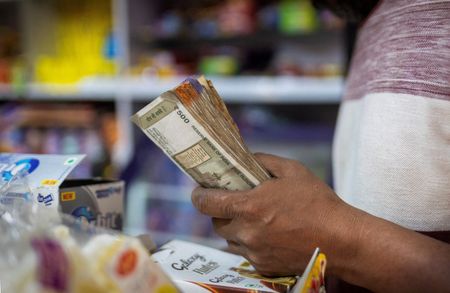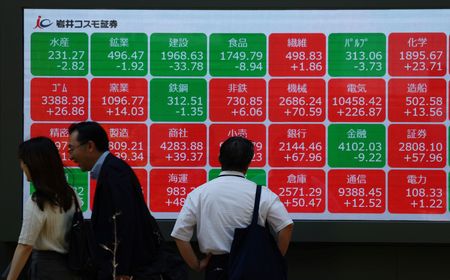By Jaspreet Kalra
MUMBAI (Reuters) – The cessation of military hostilities between India and Pakistan and a tariff truce between the United States and China brought relief for the rupee on Tuesday, helping the currency recoup nearly all of its losses from the previous week.
The rupee strengthened to a peak of 84.6350 before paring gains to quote 0.5% higher at 84.9175 against the U.S. dollar.
Dollar-rupee forward premiums and volatility expectations eased after the two nuclear-armed neighbours announced a truce over the weekend following four days of intense fighting.
India’s currency markets were closed on Monday for a local holiday.
The rupee found support from another tailwind after the U.S. and China agreed to reduce reciprocal tariffs temporarily, easing fears of a global economic carnage from a trade war between the two largest economies.
Easing worries about the conflicts were also reflected in the fall in the cost of hedging against rupee depreciation and in a tempering of near-tenor volatility expectations that came off multi-year peaks.
The 1-year dollar-rupee implied yield eased 12 basis points to 2.15% while the 1-month implied volatility retreated to under 6% after hitting a peak of 7.1% on Friday.
The 1-month dollar-rupee option volatility skew also eased after spiking last week on the back of a likely surge in demand for options betting on the rupee’s decline.
Despite the boost to risk sentiment delivered by the two truces, MUFG Bank pointed out that it’ll be key to watch not only where U.S. tariffs on China end up on an absolute basis, but also where the tariffs on other Asian countries stand relative to China.
“This is perhaps most relevant for the likes of India, Malaysia, Vietnam and Thailand which are most likely to be able to substitute China’s exports,” the note said.
India has offered to slash the tariff gap with the U.S. by two-thirds in a dash to seal a trade pact with the U.S., Reuters reported last week.
(Reporting by Jaspreet Kalra; Editing by Mrigank Dhaniwala)











